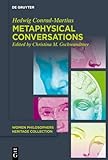Metaphysical Conversations and Phenomenological Essays / Hedwig Conrad-Martius; ed. by Christina M. Gschwandtner.
Material type: TextSeries: Women Philosophers Heritage Collection : Introduction, Translation and Original Text ; 1Publisher: Berlin ; Boston : De Gruyter, [2023]Description: 1 online resource (V, 300 p.)Content type:
TextSeries: Women Philosophers Heritage Collection : Introduction, Translation and Original Text ; 1Publisher: Berlin ; Boston : De Gruyter, [2023]Description: 1 online resource (V, 300 p.)Content type: - 9783110763065
- 9783110763157
- 9783110763096
- 193 23
- BD113 .C6513 2024
- online - DeGruyter
- Issued also in print.
| Item type | Current library | Call number | URL | Status | Notes | Barcode | |
|---|---|---|---|---|---|---|---|
 eBook
eBook
|
Biblioteca "Angelicum" Pont. Univ. S.Tommaso d'Aquino Nuvola online | online - DeGruyter (Browse shelf(Opens below)) | Online access | Not for loan (Accesso limitato) | Accesso per gli utenti autorizzati / Access for authorized users | (dgr)9783110763096 |
Frontmatter -- Contents -- Introduction -- Translator’s Notes -- Phenomenology and Speculation -- Transcendental and Ontological Phenomenology -- Metaphysical Conversations -- German Original Texts -- Phänomenologie und Spekulation -- Die transzendentale und die ontologische Phänomenologie -- Metaphysische Gespräche -- Index
restricted access online access with authorization star
http://purl.org/coar/access_right/c_16ec
This is the first translation into English of early phenomenologist Hedwig Conrad-Martius’ Metaphysical Conversations, originally published in 1921. Conrad-Martius was one of Husserl’s first students, an important part of the Göttingen Phenomenology Circle and mentor to Edith Stein, Jean Héring, and other early phenomenologists. The present volume provides the full German and English texts of the conversations, a phenomenological discussion of the nature of the human, examining the nature of body, soul, and spirit, and drawing distinctions between plants, animals, humans, and various other beings. The volume also includes two important essays on phenomenology, in which Conrad-Martius distinguishes between the phenomenological approaches of Husserl, Heidegger, and the more ontological approach of the Göttingen school of phenomenology. She is critical of Husserl’s "transcendental" and Heidegger’s "existential" approach. The conversations illustrate her use of the phenomenological method for fundamental investigations into the nature (or Wesen) of things.
Issued also in print.
Mode of access: Internet via World Wide Web.
In English.
Description based on online resource; title from PDF title page (publisher's Web site, viewed 26. Apr 2024)


